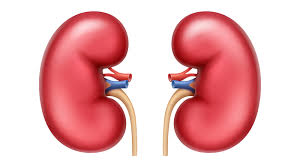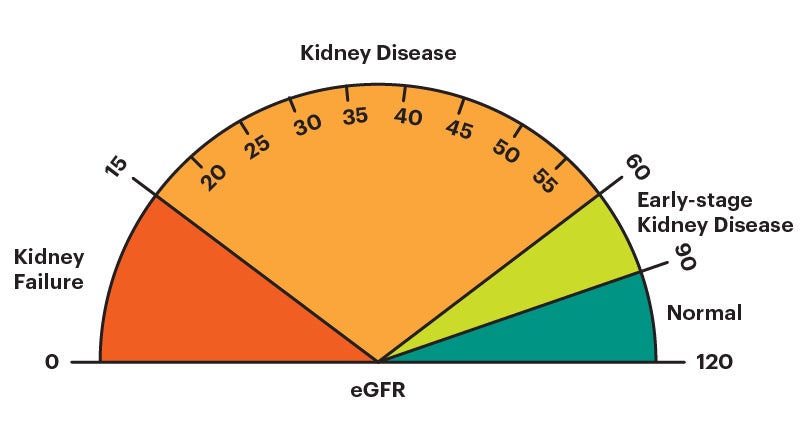7 normal kidney functions
What do the kidneys do normally?
That is a simple question, but surprisingly hard to answer [“mm .. that old answer. Yawn.” MyHSN Ed].

Most people focus on one function – i.e. waste removal (the ‘dustmen role’) – of the kidneys; as reflected by a normal blood creatinine/GFR.
This is a mistake as the kidneys have 7 functions:
- Waste removal – remove wastes (including urea and creatinine) from the body in urine
- Water and salt(s) removal – salts include sodium and potassium
- Acid removal – normal acid/alkali balance is essential for the body
- Renin production – controls blood pressure
- Erythropoietin (EPO) production – stimulates red cell production in the blood
- Vitamin D activation (strengthening) – keeps bones healthy
- Prostaglandin production – complex actions.
Back to normal kidney function
Two normal functioning kidneys will maintain the following blood tests in the normal range; and you will lack symptoms of chronic kidney disease (CKD), and will feel well.
Note. Most of the symptoms of CKD come on in more advanced stages (CKD4-5). Before that you may feel no symptoms.
This is why CKD is often called a ‘silent disease’. So in the earlier stages (CKD1-3) blood tests are essential.
1. Waste removal
You will feel well, and not have the ‘brain fog’, whole body itching, and other non-specific symptoms of CKD.
And these blood tests will be normal.
- Normal creatinine = 60-120 mcmol/L
- Normal eGFR = 90-120 mls/min (45-60 mls/min for a single kidney; 1 in 1000 people have one kidney and are fine). This number is derived from the creatinine, and goes down (as creatinine goes up) in CKD.
- The amount that it goes down leads to the stage of CKD as shown in the diagram below
- Normal urea = 3-7 mmol/L.

Note. 90% of the population are in the darker green area (have normal function). Those in the early stages of CKD (GFR 45-90 mls/min) do not necessarily progress to kidney failure.
Their GFR is more of risk factor for a kidney problem rather than a disease.
2. Water and salt removal
The fluid (and salts) that you eat or drink will be removed. You will have no extra water/salts in the body – i.e no excess fluid in your legs (leg oedema) or lungs (pulmonary oedema).
And the following blood tests will be normal.
- Normal sodium (Na) = 135-145 mmol/L
- Normal potassium (K) = 3.5-5.3 mmol/L.
Note. Sodium is usually normal in CKD. Potassium can go up in CKD4-5 (or occasionally down).
3. Acid removal
You will have normal levels of acid in the blood, and have a good appetite. When there is too much acid (in CKD4-5) you may go off your food.
The following blood test will be normal.
- Normal bicarbonate = 22-28 mmol/L.
4. Renin production
You will have normal blood pressure. This is a key sign of kidney health. But high blood pressure is also ‘silent’ (has no symptoms) in the vast majority of people.
- Normal blood pressure = 130/80 mmHg or less.
5. Erythropoietin (EPO) production
You will have normal levels of energy.
- Normal haemoglobin (‘Hb’) = 110-150 g/L in a woman, 130-170 g/L in a man.
6. Vitamin D activation
Your bones will be normal, with no pain in them.
The following blood tests will be normal.
7. Prostaglandin production
There are no specific symptoms of normal prostaglandin function or dysfunction, or blood tests to assess it.
Other signs of normal kidney function
Renal ultrasound
There should be two kidneys (or one if born with one) that look normal, and are of normal size, and = 12 cm (long) x 6 cm (wide) x 3 cm (thick). Below 10cm long is small.
Urine albumin-creatinine ratio (uACR)
This is a urine test that measures the amount of albumin (a type of protein) and creatinine in your urine. All humans have a small amount of albumin (and other proteins) in the urine.
A normal uACR is 3 mg/mmol or less. If there’s more albumin in your urine than normal, it may be a sign of chronic kidney disease (CKD).
Summary
We have described the 7 normal kidney functions. It is not just having a normal blood creatinine/GFR. It’s more complicated, and involves a lack of symptoms, with normal blood and urine tests, and a normal ultrasound, as described above. We hope it has been helpful.
Other resource
What do the kidneys do? (7 functions)
List of normal lab values

